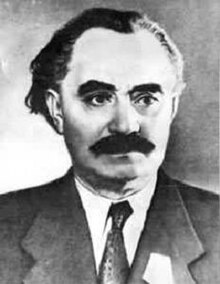Georgi Dimitrov
|
Georgi Dimitrov
Георги Димитров Михайлов
|
|
|---|---|
 |
|
| General Secretary of the Central Committee of the Bulgarian Communist Party | |
|
In office December 1946 – 2 July 1949 |
|
| Preceded by | Khristo Kabakchiev |
| Succeeded by | Valko Chervenkov |
| Chairman of the Council of Ministers of Bulgaria | |
|
In office 23 November 1946 – 2 July 1949 |
|
| Preceded by | Kimon Georgiev |
| Succeeded by | Vasil Kolarov |
| Head of the International Policy Department of the Communist Party of the Soviet Union | |
|
In office 27 December 1943 – 29 December 1945 |
|
| Preceded by | Post established |
| Succeeded by | Mikhail Suslov |
| General Secretary of the Executive Committee of the Communist International | |
|
In office 1935–1943 |
|
| Preceded by | Vyacheslav Molotov |
| Succeeded by | Office abolished |
| Personal details | |
| Born |
Georgi Dimitrov Mikhaylov (Bulgarian: Георги Димитров Михайлов) 18 June 1882 Kovachevtsi, Principality of Bulgaria |
| Died | 2 July 1949 (aged 67) Barvikha Sanatorium, Russian SFSR, Soviet Union |
| Political party | Bulgarian Communist Party |
| Spouse(s) | Ljubica Ivošević (1906–1933) Roza Yulievna (until 1949) |
| Profession | compositor, revolutionary, politician |
Georgi Dimitrov Mikhaylov (Bulgarian: Георги Димитров Михайлов)
Georgi Dimitrov Mikhaylov (Bulgarian: Гео̀рги Димитро̀в Миха̀йлов), also known as Georgi Mikhaylovich Dimitrov (Russian: Гео́ргий Миха́йлович Дими́тров) (June 18, 1882 – July 2, 1949), was a Bulgarian communist politician. He was the first communist leader of Bulgaria, from 1946 to 1949. Dimitrov led the Communist International from 1934 to 1943. He was a theorist of capitalism who expanded Lenin's ideas by arguing that fascism was the dictatorship of the most reactionary elements of financial capitalism.
Dimitrov was born in Kovachevtsi in today's Pernik Province, the first of eight children, to working class parents from Pirin Macedonia (a mother from Bansko and a father from Razlog). His mother, Parashkeva Doseva, was a Protestant Christian, and his family is sometimes described as Protestant. The family moved to Radomir and then to Sofia. Dimitrov trained as a compositor and became active in the labor movement in the Bulgarian capital.
Dimitrov joined the Bulgarian Social Democratic Workers' Party in 1902, and in 1903 followed Dimitar Blagoev and his wing, as it formed the Social Democratic Labour Party of Bulgaria ("The Narrow Party"). This party became the Bulgarian Communist Party in 1919, when it affiliated to Bolshevism and the Comintern. From 1904 to 1923, he was Secretary of the Trade Unions Federation; in 1915 (during World War I) he was elected to the Bulgarian Parliament and opposed the voting of a new war credit, being imprisoned until 1917.
...
Wikipedia
